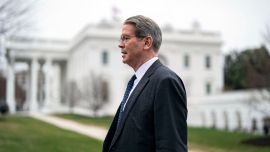President Javier Milei’s government has refused to sign up to a non-binding United Nations agreement to tackle global challenges in the coming decades, arguing it would be an “obstacle” to the nation’s ambitions.
In a fiery speech at UN headquarters in New York last Sunday, Foreign Minister Diana Mondino declared the Milei administration was not in favour of the UN’s “Pact for the Future” and would not support it.
“Many points in this pact go against or would hold back Argentina’s new agenda,” said the nation’s top diplomat, complaining that Buenos Aires’ criticisms had not been taken into account.
Argentina was one of just seven nations, out of 193 member states, to reject the UN pact. The other rejections were from Belarus, Iran, Nicaragua, North Korea, Russia and Syria.
The UN’s “Pact for the Future,” masterminded by UN Secretary-General António Guterres, is an attempt to address the multitude of sprawling 21st-century challenges that lie ahead, ranging from conflict to climate change and human rights.
Guterres billed the accord as a "once-in-a-generation opportunity" to reshape human history by rekindling international cooperation.
The pact outlines 56 "actions," including commitments to multilateralism, ending hunger and all forms of malnutrition, building and sustaining peace, eradicating poverty and upholding the UN Charter and peacekeeping.
It also calls for reforms to international financial institutions and the UN Security Council, along with renewed efforts to combat climate change, promote disarmament, and guide the development of artificial intelligence.
Serving as an opening act for the annual high-level week of the UN General Assembly, which began Tuesday, dozens of heads of state and government gathered for the signing of the text last Sunday.
But the optimism voiced by Guterreses was not shared by Argentina’s diplomats.
Mondino said that the nation’s delegation had “proposed several constructive actions that were not always taken into account.”
“That leads us to disassociate ourselves,” she declared.
The foreign minister maintained that the “reservations and objections” to the pact were not “an obstacle for Argentina, because, on the contrary, we want to have wings for our growth in liberty.”
Her criticism was echoed by fellow government officials, including Religion & Civilisation Secretary Nahuel Sotelo.
"Argentina announces its dissociation from the Pact of the Future. In the new Argentina, there is no place for totalitarian international agendas," declared Sotelo in a post on social media.
“Argentina wants to have wings for its development, without being subjected to the undue weight of decisions alien to our goals. Argentina will be a Beacon of Freedom,” agreed Mondino in a post on social media.
During negotiations, Guterres urged nations to show "vision" and "courage," calling for "maximum ambition" in his bid to strengthen international institutions that struggle to respond effectively to today's threats.
But while there are some "good ideas," the text "is not the sort of revolutionary document reforming the whole of multilateralism that Antonio Guterres had originally called for," said Richard Gowan of the International Crisis Group.
"Ideally, you would hope for new ideas," agreed one diplomat.
Despite criticism of the pact, it is still "an opportunity to affirm our collective commitment to multilateralism, even in the difficult current geopolitical context" another diplomat said, emphasising the need to rebuild trust between the Global North and South.
– TIMES/AFP/NA



















Comments